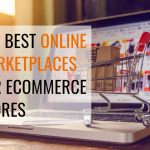Warehousing and logistics may not be the most exciting part of running an ecommerce business, but it’s a vital part of your operations.
Don’t make the mistake of putting warehousing and online fulfillment on the backburner. It’s the last step before your products arrive in the hands of buyers, and can have a direct impact on customer satisfaction. It’s also important from a growth standpoint as well, since outsourcing is something that will allow you to scale more quickly.
There are a host of reasons you’ll want to think about outsourcing this step of your operations, but it’s not for everyone. In this article, we’ll take a look at some of the signs that it’s time to outsource your warehousing.
Let’s dive in now!
What Are Third-Party Logistics?
Third-party logistics (3PL) refers to outsourcing ecommerce logistics to a third party. This includes inventory, warehousing, and fulfillment. 3PL allows you to accomplish more, more efficiently since you’ll be able to automate order fulfillment.
So why should you consider outsourcing your logistics?
Three main reasons come to mind: customer satisfaction, a time-savings for you, and the ability to scale more rapidly. There are a few additional reasons that we’ll go into in more detail below.
Most companies do one of the following:
- Outsourced Warehousing – An ecommerce business works with a third-party warehouse and order fulfillment service provider who takes care of storing, picking, packing, sending, and tracking packages.
- In-house Warehousing – The business handles their own storage and order fulfillment. The warehouse facility can either be rented or owned, with their own team of employees doing the work.
Some businesses have a hybrid of outsourced and in-house warehousing, which helps them with partial risk management while at the same time offering flexibility and control.
(Source: ShipMonk)
8 Reasons to Outsource Your Warehouse
Now, let’s delve into some of the main reasons why you’ll want to think about outsourcing your warehouse operations.
To Save Time
You know it’s time to reassess your warehousing and logistic operations when you’re spending most of your time on the order fulfillment part of the business.
For most businesses, a major reason for outsourcing is to save time. This allows them to focus on more pressing issues, like the core business processes that directly drive sales. A company’s employees can focus on their own roles without stretching themselves too thin doing other functions. This ultimately helps your business grow, allows you and your employees to do what you do best, and improves workplace satisfaction.
Tip: Finding it hard to keep up with buyer demand? That’s a good sign that it’s time to outsource. Likewise, fluctuations in demand can make it hard for you to provide a consistent service, which is something that a logistics company can help with.
To Improve Your Process
Next up, customer satisfaction is another good reason to outsource. Your warehouse and online fulfillment affect how quickly your products get to your customers. Ware2Go, a UPS company, says that 39% of online merchants get better reviews from quick shipping and 59% say that a two-day shipping guarantee helps to bring them repeat customers.
An inefficient order fulfillment strategy can result in a great deal of wasted time, not to mention money. Long shipping times or deliveries of the wrong items or damaged goods are situations that you’ll want to avoid at all costs. A good 3PL provider allows you to delight your customers, improve their buying experience, and build trust in your brand.
Slow, sloppy shipping is a big threat to your sales. Entrepreneurs who have gone the DIY order fulfillment route know there’s a lot of work involved after a customer places an order. If you don’t have enough staff or a good system in place, you end up doing time-consuming tasks such as searching for items in storage, verifying and packing products safely, creating shipping labels, sending, and then tracking.
Working with an outsourcing partner lets you gain access to a team of industry experts who can do these services better, faster, and at scale.
Working with an outsourcing company also gives you access to their world-class capabilities that include teams of experts, the best logistics management software, insurance, and regulation-compliant facilities. Professional warehouses are adapted to storing goods, making sure your products are kept safe and undamaged.
Tip: Is customer satisfaction down due to slow shipping or packaging issues? Then it’s time to think about outsourcing. Working with a logistics partner can fix this. Well-packaged orders that ship fast equals happy customers. This improves brand reputation and customer retention as well.
To Increase Your Conversion Rates and Sales
High shipping costs continue to be the main reason for shopping cart abandonments with 66% of buyers expecting free shipping from online shops. Aside from low shipping costs, consumers also want deliveries to be fast. More than 90% of U.S. consumers consider a two-to-three-day delivery as the baseline.
Affordable and fast shipping not only improves conversions but boosts average order value as well. Some 58% of customers will add products to their cart to qualify for free shipping. Outsourcing lets you ship faster and cheaper. Coupled with a fast turnaround time, this means higher chances of increasing your sales volume.
Tip: On your website and social media ads, make sure to market your short delivery times. Adding a 2-3 day shipping guarantee label makes it even more enticing for customers who want their orders fast, but make sure your logistics partner can deliver. Run some calculations and also consider offering reduced, free, or upgraded shipping for customers who reach a minimum threshold to increase their average order value.
(Source: McKinsey)
Get our 8 Reasons to Outsource Your Warehouse - Worksheet delivered right to your inbox.
(Source: McKinsey)
To Reduce Costs
Running a warehouse means investing in infrastructure and equipment. An outsourcing partner shoulders these heavy costs, saving you capital that you can spend on marketing or production. Additionally, outsourcing facilities, because of their size, can often negotiate better deals with carriers, shipping companies, and suppliers for packaging material. Sharing these resources makes operational costs lower for you.
For Scalability (And Agility)
You’ll be able to grow your business far more quickly when you outsource warehousing. Just increase your hired space, and you’ll be able to fulfill new requirements. On the other hand, during the slow season, you can also scale down to lower your costs.
Most businesses would love to see demand for their product increase, but failing to handle the extra workload could spell disaster. You don’t want to overpromise and underdeliver. Outsourcing companies and warehouses have staff that are trained and dedicated to fulfillment. You won’t feel pressured to hire new employees. This is also a good way to handle an increase in demand that may only be seasonal or temporary.
Tip: Choose a warehouse and logistic company that offers a variety of plans and flexible pricing. It allows you to easily adapt to demand fluctuations and adjust your costs accordingly. Avoid long term leases that don’t allow room for customizations or make it hard for you to leave.
To Expand Into New Markets
Working with an outsourcing partner based in a different state or other countries is also a great way to explore new markets. Chris Cashin, CEO of Parcel Consulting writes in Forbes, “Leave it to the experts who have the lay of the land and will handle the details that are foreign to you.”
Tip: If expanding to new areas is your next step, outsourcing your warehouse and order fulfillment to a local partner takes away the headache of setting up logistics from scratch and calculating shipping costs. Select a partner that has a presence in several locations so you can continue working with them as your business expands.
Consider the proximity of the warehouse to highways, railroads, and ports. The closer the warehouses are to these, the less time it will take for your orders to be shipped.
For Risk Management
Operational risks are risks associated with owning a physical warehouse such employee injuries, property damage, inventory damage, and lost orders. Reputable outsourcing partners are specially trained and well-equipped to handle and ship products to your customers, already reducing risk from the start. In case problems arise, the warehouse companies are responsible for these.
Tip: Before signing anything, carefully check the insurance policies and disclaimers of the warehouse and fulfillment providers. Make sure that costs for damaged inventory and shipments are covered. If it’s possible, visit the warehouse in person or ask for a virtual tour to check if standards of safety and quality are met. This also allows you to get a better feel of how your products are handled and moved along during the fulfillment process.
To Reduce the Need to Hire Employees
Hiring new employees can be a logistical nightmare. Then there are HR concerns to consider, with the onboarding process requiring a great deal of time, resources, and paperwork. Warehouse staff management can also be time-consuming for your HR team and accounting department. Outsourcing work of your warehouse operations also outsources some HR functions and accounting department responsibilities as well.
When to Keep It In-House
While there are many benefits and good reasons for outsourcing, it may not be the best option for all businesses.
Here are some reasons why some companies choose to keep their warehousing in-house:
More Control Over Stock
For some entrepreneurs, having complete control over their inventory, processes, and data is important. It helps them fine-tune their distribution process and look at ways of improving their own system. They also may not be comfortable sharing customer data with a third-party provider.
The Business Isn’t Large Enough
If your sales volume isn’t large enough, outsourcing your warehouse operations may eat into your profits. Look back into your business goals. Will you be better off saving money or time? Consider which option will drive your business forward.
Scale Slowly and Steadily
Not all companies want to scale fast. For those who choose to scale their operations at a moderate pace, sticking with an in-house facility may be a better option.
Distribution as a Core Business Process
The speed and efficiency of an order fulfillment strategy is a competitive edge you can have over others. Maybe you also want to master your own in-house strategy as a way to expand your company in the future. If you consider distribution as an important core business process, then going with an in-house model lets you master your own supply chain in preparation for vertical diversification in the future.
Branding Opportunities
One great way to add an authentic touch to your marketing is by adding personalized messages, inserts, or special gifts to customer orders. This might not always be possible when you work with an outsourcing partner, and those who do support it consider it as an add-on service with extra fees.
(Source: Father Time Bread on PackLane)
Top Qualities of a Good Warehouse
Here are a few qualities of a good warehouse:
They Should Prioritize Security
A safe and secure storage facility gives you peace of mind and ensures your products are kept safe from fires, water leaks, or theft.
But even with the best infrastructure, emergencies can occur. A warehouse facility should have the ability to handle situations like this by having proper emergency protocols in place to prevent employee injuries and unwanted loss of inventory. Having insurance is also a great way to protect your business assets and warehouse. Make sure that your warehouse consistently meets standards of quality and safety.
A Close Proximity to Your Target Market
The farther the shipping destination is from the warehouse, the more expensive it will be to ship. It affects the speed, too. If your target market is concentrated in certain states or in other countries, taking service delivery closer is a wise move that can help save costs and time. This gives you the ability to deliver quickly and pass on savings to your customers by offering affordable or even free shipping.
Up-to-Date Software
Businesses that do their own warehouse and fulfillment operations use their own spreadsheets, systems, or purchased software to manage inventory. Outsourcing partners also have their own management systems. Using up-to-date software is one way to supercharge your warehouse strategy. It makes transactions fast, seamless, well-documented, and easy to trace.
Excellent Service and Support
Well-trained staff who are quick and efficient contribute greatly to the success of an online business. A good workflow with standards set in place improves overall output. When working with an outsourcing partner, also look into customer service support for partners. You want to work with a company that’s easy to reach and has the ability to provide solutions quickly.
Cost-Efficiency
Whether you’re buying, renting, or outsourcing to a third-party warehouse, calculate all of the associated costs that come with it. Ask for a quote, and don’t be afraid to negotiate. Both models will cost something, whether that’s money, resources, or opportunity costs. Look into how this affects your company’s bottom line and growth.
There’s no doubt that a good logistics strategy can give you a competitive advantage. A good
fulfillment system streamlines your work, allows you to ensure fast delivery, and makes it easier for you to scale. If you’d like to start stepping up your operations or branch out into new markets, then outsourcing warehousing, along with inventory management and order fulfillment, to a 3PL company is something that just makes sense.
The Next Steps
Step One: Run a cost analysis of outsourcing versus doing your warehousing yourself. Make sure you factor in variable costs and overhead costs when running the numbers. Fixed costs are ongoing each month and stay largely the same. Variable costs will change depending on output and how many orders are being put through. Learn more about calculating logistics costs here.
Step Two: Locate a good 3PL provider. Here’s a list of 17 good 3PL providers.
Step Three: Now that you have a few 3PL providers in mind, get some quotes. Then, run a cost-benefit analysis to see if it makes sense to outsource your logistics.
Looking to scale your business operations? Reach out now for your free 20-minute consultation call. Let’s talk about strategies tailor-fit for your ecommerce business that will help you scale quickly and efficiently.
Get our 8 Reasons to Outsource Your Warehouse - Worksheet delivered right to your inbox.







